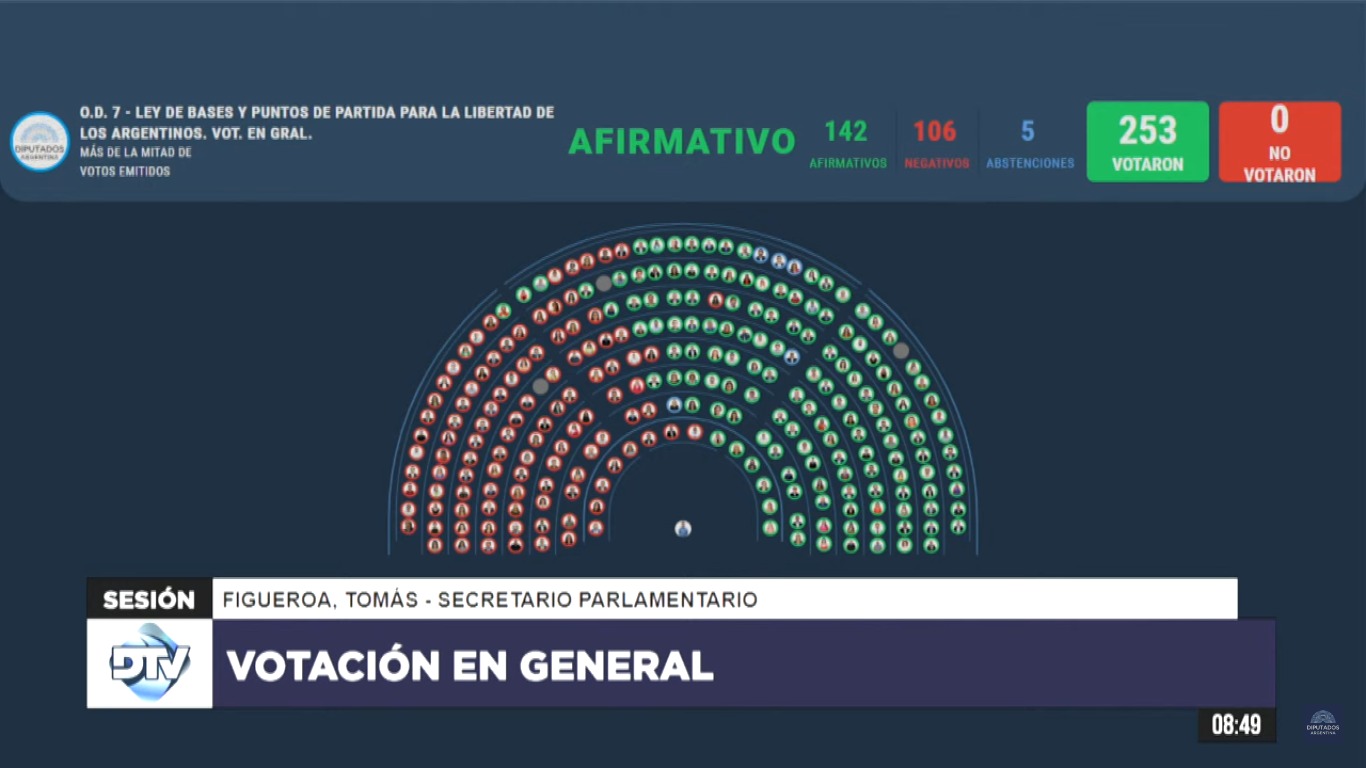
The general vote on the omnibus law was with 142 in favor, 106 against and 5 abstentions, after more than 20 hours of session. The particular vote took place for about 5 hours. As a result of the negotiations and the Milei government, this time no article or chapter was dropped. La Libertad Avanza had firm allies in the PRO, the majority of the UCR and We Make the Federal Coalition, Federal Innovation and the 3 former Union for the Homeland from Tucumán. Although there were chapters where some dissent from the collaborationist blocs was expressed, all the chapters and articles included in the opinion were voted on. These were the results of the main votes in particular on the omnibus law.
Delegation of powers
The delegation of powers was approved with 134 votes in favor and 117 against. It will allow Milei to govern by decree in administrative, economic, financial and energy matters.
It was questioned on the premises by Christian Castillo as unconstitutional.
Modify or dissolve state agencies
The “Administrative Reorganization” of the state reform was approved with 135 affirmatives, 116 against and 2 abstentions. It will allow Milei to modify or dissolve public organizations at will, for example the National Disability Agency or the National Genetic Data Bank.
Representative Bregman asked for the withdrawal “it is one of the most dangerous” she said. “They are going to leave thousands of workers on the streets.”
Privatizations of public companies
They were approved with 138 affirmatives and 111 negatives. The chapter includes a package of public companies subject to total privatization (4), to concession (5) and that must maintain a state majority (2).
Changes of administrative procedures It was approved with 148 affirmative votes and 104 negative votes.
Public employment
Approved with 138 affirmatives, 113 negatives, and 1 abstention. It implies an attack on state workers, losing job stability among other issues.
Contracts and concessions (public works)
The executive branch will have more freedom to change public works contracts. The one on current contracts and transactional agreements obtained 134 affirmatives, 111 negatives, 6 abstentions. The concessions vote resulted in 142 affirmative votes, 107 negative votes and 4 abstentions.
Labor money laundering
With tax benefits for employers who do not have their workers registered, it is approved with 147 affirmative votes and 103 negative votes.
Labour reform
- To repeal aggravated compensation for unregistered workers. It came out with 140 affirmatives, 111 negatives
- To increase the trial period (from 3 months to 6 and up to 12 months), legalize labor outsourcing, enable discriminatory dismissals: 138 affirmative, 112 negative, 3 abstentions
- Termination fund, for “easier and cheaper” layoffs. Approved with 136 affirmatives, 113 negatives and 4 abstentions
- “Collaborators”: companies with up to 5 workers can lose rights and become “collaborators” and monotributistas (without vacations or bonuses or licenses): 136 affirmative, 113 negative and 2 abstentions
- Greater precariousness of agricultural work: the vote was 141 affirmative and 110 negative
- Several derogations, including getting double compensation if they do not have you registered, plus precariousness for workers in private homes. It was approved with 136 affirmative votes and 113 negative votes.
Energy
It was approved by majority:
- Complete liberalization of exports and imports of hydrocarbons. Companies can export without guaranteeing internal supply. It is a huge business for large conglomerates.
- Delivery of special powers to the Government for the regulation of energy activity.
- The State is prevented from intervening in the setting of prices for any of the segments of the hydrocarbon chain.
Incentive Regime for Large Investments (RIGI)
All of its chapters were approved by majority. Even its creation, in chapter 1, was accompanied by 6 deputies from Unión por la Patria de Catamarca and San Juan, and one more contributed by abstaining.
- Gives huge tax benefits to large investments. A direct benefit to large multinationals and transnational capitalist groups. Peronist deputies (Unión por la Patria) voted in favor.
- Another benefit is giving them free availability of dollars until 2038. The mining, oil and knowledge economy sectors are especially benefited.
Elimination of pension moratorium
It was approved with 125 affirmative votes and 113 negative votes. It implies raising the retirement age for women to 65 years if they do not have all the contributions, that is, for 9 out of 10 women, and with much lower assets.
Incorporation of Internal Taxes on Tobacco
It was a debate highly anticipated by the two-party tobacco lobby. Finally, the modifications to internal taxes are incorporated into the omnibus law with 82 in favor, 77 against and 69. Philip Morris celebrates and Sarandí (Otero) loses. Both lobbies operated strongly in Congress in recent months.
Source: www.laizquierdadiario.com

